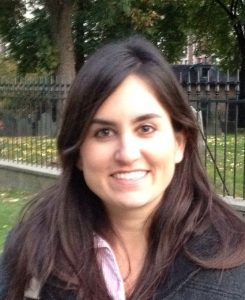
I took four years of Latin in high school. I thought a good grasp of Julius Caesar’s language would help me decipher the meaning of words I’d never heard. This proved true, particularly during the SATs. I also studied Latin because it is valuable for students considering careers in science, which I was. (For example, many terms for human anatomy can be traced to Latin roots.)
By my senior year of high school, though, I was a bit envious of my classmates who’d studied French, German, or Spanish. They could speak the languages they’d learned—both at school and in our community. Meanwhile, older friends of mine were returning from college semesters abroad.
“Going abroad will change your life!” they’d say.
When I talked with those of them who’d traveled to non-English speaking countries, one element of their experience stood out: how much they enjoyed speaking that region’s language. Knowing it had opened doors to them…whomever they wanted to get to know—the local clockmaker, the elderly businessman, etc.—could.
I began to wonder what it would be like to get off a plane in another country—so different than my own— and move easily through the crowd, safe in knowing I could speak the country’s language as I navigated new streets and towns. It was thrilling.
My senior year of high school then, I started Spanish, a language I’d always been interested to know. Having been exposed to the basics of modern Romance languages in Latin, Spanish was a pretty quick study. When I got to college, I continued with Spanish classes, even making Spanish my minor. I learned I could travel not only to Spain through available study abroad programs for Spanish speakers but also to South America and Mexico. (I went to Spain and learned to flamenco. Also, I ran Seville’s streets. I did not run with the bulls.)
Traveling abroad, while academic in nature, is a very personal experience. Whether you choose to go often comes down to how well you believe you can do away from home and in a place in which many aspects of daily life are completely different. Indeed, some cultural differences are even more striking than others. (My own experience living in Seville, Spain, required less adjustment than one of my French-speaking friends’ experiences in Morocco.)
If you are thinking study abroad will be right for you, you may want to start thinking about where you’d like to go.
If you are studying a language now, where is it spoken? (Did you know French is spoken in Africa? And German in Austria?) Go online (most college websites have a dedicated study abroad section) and see if the locations you’ve identified are available to you as a study abroad student through pre-established programs.
Would you want to travel to these locations?
If you have a strong urge to travel to non-English speaking locations other than these, is that reason to consider studying a different language?
Bear in mind that most colleges require a certain level of language proficiency for students considering study abroad. What’s more, they often suggest that students travel in their junior year; beginning language study in high school makes it more likely you’ll acquire the requisite language proficiency by the time you’re a college junior.
Meanwhile, if you choose to study abroad in college, know that your experience may be different than your fellow students’, depending on your major. For some college students, incorporating study abroad time is a bit more straightforward. If you are a French literature major, for example, spending a semester in France likely already has a pre-approved stamp of approval from the college’s French Department.
If you are majoring in physics, however, spending a semester away from any lab courses and the long list of prerequisites you must complete can make your four years challenging to schedule. Never fear, though, I was a biology major, and I did it. Ways to work around academic difficulties exist (consider summer study abroad programs if you can’t study abroad during the academic year, or programs in countries like England and Australia, where you could take science classes in English, all the while having an awesome study abroad experience in a totally new culture).
Want to know more?
If you’d like to know more about study abroad, and where the language you are studying as a high school student could take you, contact a campus study abroad office at a local college. Don’t forget, too, that just as you can create your own major at some colleges, you could even work with a different college—one other than that which you will attend—to shape your own study abroad program.
Carpe diem!
Meagan Phelan holds an M.A. in Science Writing from The Johns Hopkins University in Baltimore, MD and a B.A. in Biology from Gettysburg College in Gettysburg, Pa. She has freelanced as a science writer and is a Fulbright Scholar. She currently works as a Senior Writer and Editor at AIR Worldwide, a catastrophe risk modeling firm based in Boston.
Are you considering studying abroad? If so, where? Please share your experiences.
Post your tips/comments below.

It’s great that you were able to squeeze in a study abroad experience despite studying in the field of sciences – I know quite a few people who have the mentality that “there isn’t enough time!” and it’s simply not true! Here’s some more info for any Biology majors who are interested in studying abroad – you never know what the adventure wil be like! http://www.gooverseas.com/go-abroad-blog/biology-majors-who-and-why-should-study-abroad/18209